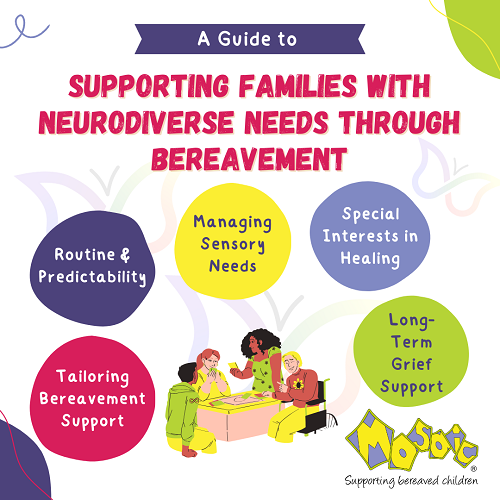Supporting Families with Neurodiverse Needs Through Bereavement

1 in 8 children and young people (12%) who receive support from Mosaic have a special educational need (SEN) or neurodiversity, highlighting the importance of specialised care for these families.
Grief is a universal human experience but the way it manifests can vary widely. For families navigating bereavement with neurodiverse children or young people, understanding and tailored support can make all the difference. At Mosaic, we recognise the unique challenges these families face and are committed to providing compassionate, accessible care.
Understanding Neurodiversity and Grief
Neurodiversity encompasses a range of conditions, including autism, ADHD and other developmental differences. Neurodiverse people often process emotions and experiences differently from neurotypical peers. Grief can be particularly challenging, as changes in routine, heightened emotions and the abstract concept of death may be difficult to process. Sensory sensitivities and a preference for predictability may further complicate the grieving process.
When neurodivergent people are grieving, their characteristics can become more pronounced. They may not show any emotion, or emotions may be delayed and extreme when they do emerge. They may find it difficult to express how they are feeling which can lead to withdrawal or shutdowns.
Tailoring Bereavement Support for Neurodiverse Children and Young People
Providing effective support starts with understanding the individual’s specific needs. A person-centred approach is key:
- Use clear, concrete language when discussing death and loss, avoiding euphemisms like "gone to sleep" or "passed away" which could be taken literally and instead say, "They have died, which means their body has stopped working and they can’t come back."
- Be patient and allow extra time for questions and processing. Grieving neurodiverse children may need to ask the same questions repeatedly as they process information.
- Use visual aids, social stories or other tools that resonate with the individual’s learning style. These can help to illustrate abstract concepts and provide a tangible way to explore emotions.
Supporting Neurodiverse Children Through Bereavement
Children may show their grief differently from adults. Neurodiverse children might:
- Repeat questions about the person who has died, seeking reassurance and clarity.
- Experience regression in behaviours or struggle with emotional regulation.
Some children may express their grief through actions rather than words. Be consistent, patient and prepared to revisit conversations about loss over time. Encourage open dialogue and offer repeated reassurance.
The Role of Routine and Predictability in Coping with Loss
Routine provides a sense of security which can be deeply comforting during times of upheaval. For neurodiverse children, sticking to familiar routines as much as possible can help reduce anxiety. When routines need to change, consider these strategies to support neurodiverse children effectively:
- Prepare for unavoidable changes by explaining them clearly and repeatedly in advance.
- Create visual schedules to illustrate new routines or special events, such as a funeral or memorial service – this provides structure and reduces uncertainty.
- Incorporate predictable rituals around remembering the deceased, such as lighting a candle or visiting a favourite place.
Managing Sensory Needs During Difficult Times
Funerals, memorial services and gatherings can overwhelm a child with sensory sensitivities. Strategies to help manage these experiences include:
- Reducing auditory overstimulation with noise-cancelling headphones or a quiet space for breaks.
- Bringing familiar, comforting objects to help self-soothe – items such as a favourite toy or weighted blanket can provide grounding.
- Preparing the child for sensory input like music, crowds or physical touch by explaining what to expect in advance.
The Role of Special Interests in Healing
Special interests can provide comfort, structure and a sense of control. Integrating these interests into remembrance activities can be a powerful way to honour both the person who has died and the child’s needs. Here are a few ideas:
- Create a memory box or scrapbook using materials related to a favourite subject. This tangible activity can foster positive reflections.
- Incorporate storytelling, drawing or other creative outlets that align with their interests. Allow them to express emotions in ways that feel familiar and safe.
Self-Care for Parents and Caregivers
Supporting a bereaved neurodiverse child can be exhausting. It’s important that caregivers prioritise their own well-being and can do so by:
- Building a network of support by connecting with local groups, therapists or charities like Mosaic. Sharing experiences with others can reduce feelings of isolation.
- Taking breaks when possible and seek respite care if needed. Even short moments of rest can recharge emotional reserves.
- Practising mindfulness or relaxation techniques to manage stress. Breathing exercises and meditation can be particularly helpful.
Remembering in a Way That Feels Right
Every family has unique traditions and preferences for honouring their loved ones. Neurodiverse children may need personalised ways to participate, such as:
- Simple, repetitive rituals that provide comfort – predictable actions offer security.
- Expressing their grief through play, art or movement – creative activities are a safe outlet for complex feelings.
- Activities that feel joyful and connected to positive memories, such as baking a favourite recipe or engaging in a shared hobby.
Long-Term Grief Support for Neurodiverse Families
Grief doesn’t follow a timeline. Neurodiverse children may need long-term or intermittent support, such as:
- Revisiting discussions about the deceased as understanding grows. Children often develop new questions as they mature.
- Using anniversaries or milestones as opportunities to check in and talk. These moments can provide meaningful opportunities for reflection.
- Staying vigilant for signs of prolonged or complicated grief. Professional counselling may be necessary if difficulties persist.
At Mosaic, we believe in the power of community, understanding and tailored support. If your family is navigating bereavement with neurodiverse needs, we offer resources, guidance and compassionate care. Find out more about how we can support you and please don’t hesitate to get in touch if you have any questions.